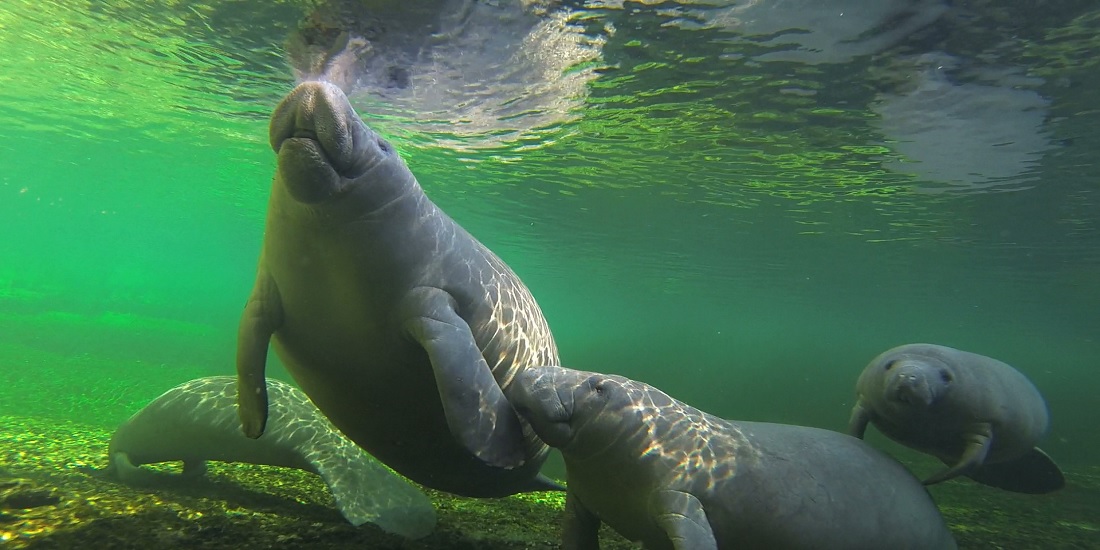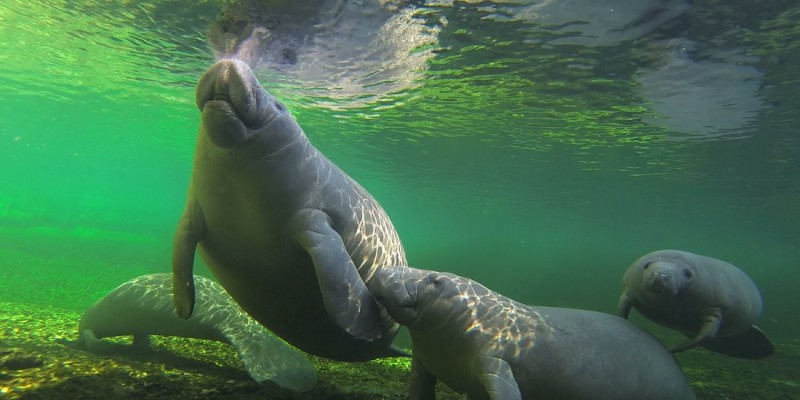Florida Manatees Get Scrooged for the Holidays
Chamber of Commerce Pressures Delay of Manatee “Swim-With” Safeguards
Industry pressure has blocked implementation of steps to protect endangered Florida manatees from harassment by “swim with the manatees” tourists, according to Public Employees for Environmental Responsibility (PEER). As a result, hordes of swimmers may drive manatees from the warm spring refuges critical to their survival as winter nears.
This September, the U.S. Fish & Wildlife Service announced plans to significantly limit the number of tour operator permits issued, require trained guides to accompany a maximum of five “swim-with” visitors, prohibit diving and use of fins, and enact other measures for the largest warm water habitat for the manatees – the Three Sisters Springs Unit of Crystal River National Wildlife Refuge. After reviewing public comments, the Service decided that its original plan did not do enough to protect the manatees and announced further restrictions on November 10th, including reducing the maximum number of visitors allowed in the water at any one time and other control measures.
These measures were slated to go into effect this week but, citing pressure from “tour operators, the Citrus County Chamber of Commerce, and congressional representatives,” the Service announced it would take three more weeks of public comments. This additional delay pushes any decision past the beginning of manatee season and into the New Year. Consequently –
- Rampant abusive tourist behavior, such as kicking, chasing or surrounding manatees and separating mothers from calves, will continue unabated;
- Even emergency closures of entrances and narrow bottlenecks are on hold; and
- A record number of tourists are expected to descend onto this vital warm spring habitat that is less than one acre in area.
As the Service’s Draft Environmental Assessment noted:
“Of particular concern is the spring run area, the current in-water entrance to the Springs. At the narrowest point, at mid-tide, the spring run is approximately 5 feet wide. These limited dimensions create a bottleneck for manatees, snorkelers, and paddlecraft that may cause a safety hazard to visitors as well as the potential to disturb manatees. Additionally, manatee ingress and egress has strong possibility to be blocked on many occasions due to the high volume of snorkelers and boaters…”
“By trying to make its plan more effective, the Service got politically sideswiped to the detriment of the manatee,” stated PEER Executive Director Jeff Ruch, whose organization has long been pressing for safeguards and releasing internal documents showing that visitor behavior has “gotten out of control.” “Manatees are getting stiffed this year for the holidays.”
So far this year, 367 endangered manatees have died from causes ranging from collisions with boats to cold stress. A severe cold snap this winter could cause manatee deaths to spike much higher as has occurred in past years.
~~~~~~~~~~~~~~~
About PEER
Public Employees for Environmental Responsibility (PEER) is a national alliance of local state and federal resource professionals. PEER’s environmental work is solely directed by the needs of its members. As a consequence, we have the distinct honor of serving resource professionals who daily cast profiles in courage in cubicles across the country.
Public employees are a unique force working for environmental enforcement. In the ever-changing tide of political leadership, these front-line employees stand as defenders of the public interest within their agencies and as the first line of defense against the exploitation and pollution of our environment. Their unmatched technical knowledge, long-term service and proven experiences make these professionals a credible voice for meaningful reform.
PEER works nation-wide with government scientists, land managers, environmental law enforcement agents, field specialists and other resource professionals committed to responsible management of Americas public resources. Resource employees in government agencies have unique responsibilities as stewards of the environment. PEER supports those who are courageous and idealistic enough to seek a higher standard of environmental ethics and scientific integrity within their agency. Our constituency represents one of the most crucial and viable untapped resources in the conservation movement.
Objectives of PEER
- Organize a broad base of support among employees within local, state and federal resource management agencies.
- Monitor natural resource management agencies by serving as a “watch dog” for the public interest.
- Inform the administration, Congress, state officials, media and the public about substantive environmental issues of concern to PEER members.
- Defend and strengthen the legal rights of public employees who speak out about issues concerning natural resource management and environmental protection. Provide free legal assistance if and when necessary.



